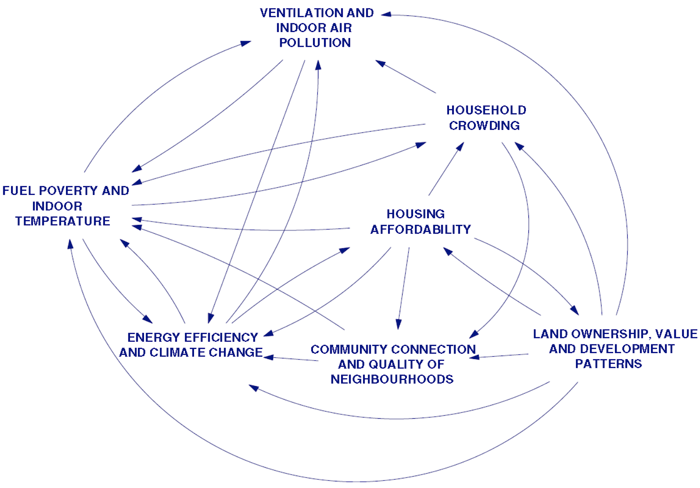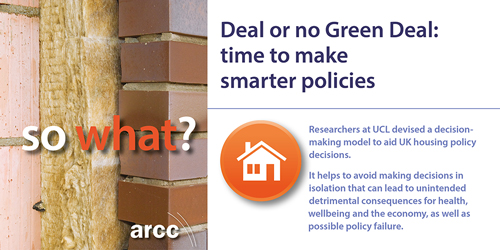Policies about housing, energy and wellbeing – like other policies – can have a broad range of impacts that may not be immediately apparent and can ultimately result in policy failure.
Researchers at UCL suggest we can greatly improve the effectiveness of housing policy decisions by making the review process more dynamic, enabling testing of the causal linkages between housing, energy efficiency, health and wellbeing.
The UK government has an ambitious goal to reduce carbon emissions from housing through energy efficiency improvements. This narrow-focus policy provides a strong driver for change. However, the implementation has resulted in both positive and negative unintended consequences across a broad range of outcomes for health, equity and environmental sustainability. Now these complex inter-linkages have been identified, researchers are working to help policymakers test draft policies against this continually evolving evidence base, in order to clarify the potential repercussions of implementing new housing policy.
Relevance
This research aimed to:
- Move from considering individual housing policy objectives in isolation to mapping the links between the environmental, economic, social and health outcomes of housing as a complex system.
- Support housing policy stakeholders in a collaborative learning process to improve their understanding of the complexities.
- Enhance combined benefits in policy outcomes and avoid or be explicit about any trade-offs.
Participatory system dynamics (PSD) modelling allowed development of an in-depth, causal theory linking housing, energy and wellbeing.
The process
- Participants included more than 50 representatives from 37 organisations, from national & local government, housing industries, non-government organisations, communities and academia.
- Stakeholder interviews were followed by interactive workshops to develop the model.
The process resulted in:
- a shared understanding of wellbeing in a housing context;
- an agreed set of criteria against which to assess future policy options;
- a comprehensive set of causal loop diagrams (CLDs) describing the housing, energy and wellbeing system.
Now what?
A collaborative learning process trialled by researchers from UCL has helped a wide range of housing stakeholders, including policymakers, adopt a more integrated and dynamic approach to devising and delivering housing policy.
Researchers found that a combination of participatory system dynamics (PSD) modelling and other methods for weighing up policy options provides a powerful mechanism to help policy makers achieve shared housing goals that enhance, rather than conflict with, physical, mental, environmental, economic and social wellbeing of the British public.
Policymakers / stakeholders
- Can make use of the qualitative model as it is useful for all those involved in UK-housing policy.
- Can incorporate participatory system dynamics (PSD) modelling to support improved housing policymaking by integrating a broad range of outcomes across wellbeing, social and health equity, and environmental sustainability.
- Can avoid making decisions in isolation that can lead to unintended consequences and potentially expensive and time consuming policy failure.
Overview of the seven interconnected themes developed during the modelling

Researchers:
- Continue to validate the model, include simulations to explore future policy options and combine PSD modelling with other policy assessment tools.
- Are further investigating methods to support shifts in the conceptual frameworks underpinning policy, that will be necessary for healthier, more sustainable housing.


